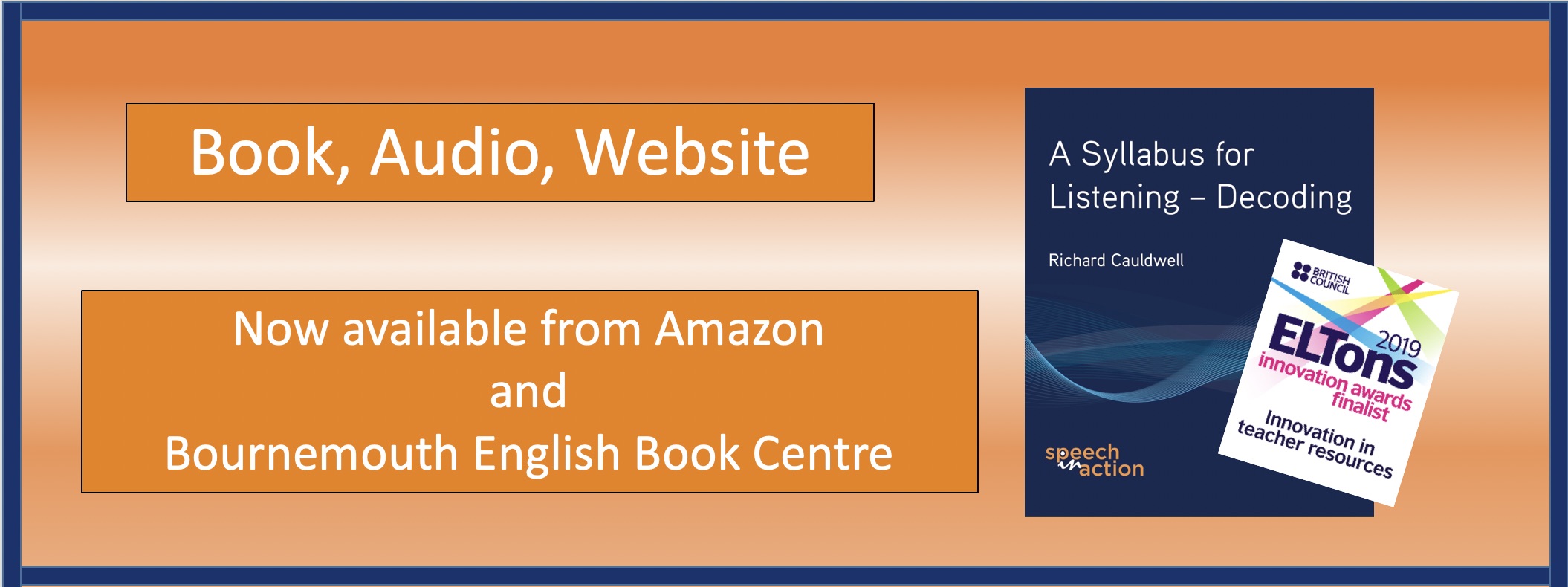A Syllabus for listening – Decoding
A Syllabus for Listening: Decoding is a finalist in the Teacher Resources category of the British Council’s ELTONs awards 2019 for innovations in English Language Teaching. More here.
.
A Syllabus for Listening: Decoding is available as both a printed book and as an eBook. You can get the print copy either from Amazon here or from the Bournemouth English Book Centre (BEBC) here. You can get the eBook from Amazon here. Please note that it is a print replica eBook, and that it will not be readable on all Kindle devices – please check before you purchase. If you have a Kindle Fire tablet from the third generation onwards, or a the Kindle for Android reading app on Android phones and tablets, you will be able to hear the embedded sound files.
A Syllabus for Listening – Decoding is for experienced teachers, teacher-trainers, course designers, course book writers and textbook authors. It focuses on the information and skills required for teaching learners how to decode the sound substance of speech.
Short video introduction
This is a thirty second promotional video that I created for the ELTONs 2019 awards ceremony.
Rationale
Three decades of work on spontaneous speech has convinced me that there is something of great importance to teach in the listening classroom – the sound substance. The sound substance is the acoustic blur of the multiple sound shapes that all words have (e.g. able has the soundshapes ale, aboo, ell, evil, eewil), and the rhythmic patterns that give form to these sound shapes. Teaching the sound substance is the acoustic equivalent of teaching spelling, except there are many more variations in the sound shapes of words than there are in their spelling.
Here are the main reasons why A Syllabus for Listening: Decoding should be an integral part of every teacher’s and every author’s training:
- Listening is poorly taught and learned
- Listening methodology is dominated by testing
- There is almost no work on teaching decoding
- Textbook recordings are under-exploited
- ELT avoids direct encounters with the realities of everyday speech
- There is an over-reliance on strategies
- ELT often behaves as if there is nothing to teach – there is only practice, exposure
- Even advanced learners (great at reading, writing and pronunciation) struggle with perceiving and understanding everyday speech.
- Textbooks increasingly feature real-world recordings of speech, but the realities of the sound substance of these recordings are ignored or …
- the textbook repeats standard untruths about speech (stress-timing, nuclear stress rules, question intonation, etc) in defiance of the evidence of the recordings.
In the absence of adequate knowledge and skills, and in the belief that there is nothing to teach about the sound substance, the listening classroom is filled with ‘other stuff’: contextualisation, schema activation, prediction, strategies (cognitive, metacognitive, socio-affective, etc). And being able to manage this ‘other stuff’ is regarded as the hallmark of being a good teacher of listening. (I should emphasise that this ‘other stuff’ is useful, but it dominates classroom time, and it should be subservient to teaching decoding.)
There is something to teach. THERE IS SOMETHING TO TEACH. There follow some principles, and an example.
Principles
- All words have multiple sound shapes, flavours and colours
- Words occur in clusters (word clusters) rhythmic groups
- Each component of the cluster or group influences the sound shapes of its neighbours
- The prime determiner of the sound shapes of words are the choices of rhythm and emphasis made by the speaker
- All textbooks rules about speech are untrue of everyday speech
Example
In a television commentary before a rugby sevens game in the Rio Olympics, one of the commentators (Sir Clive Woodward) said ‘It’s going to be a very physical encounter’. Except, he didn’t say that, he said:
|| sgunna be a VEry fizzle enCOUNter ||
notice that ‘it’s’ has been reduced to |s| and ‘going to’ has been reduced to ‘gunna’ and that ‘physical’ has been reduced to ‘fizzle’.
Syllabus for Listening will explain why such reductions happen, and will provide activities to make learners familiar and comfortable with these features of the stream of speech – which happen all the time.
Dissatisfied with the way listening is taught?
It is for people who are dissatisfied with current approaches to teaching listening – people who are fed up with:
- ‘Oh look English is stress-timed’
- ‘Prediction makes the words go slower’
- ‘Just lie back and listen to lots’
- ‘Don’t worry about a thing’
- ‘I can’t teach you, you just have to learn it through exposure’
Resources
You can read a detailed description of the contents here, download recordings here and find indexes here.

